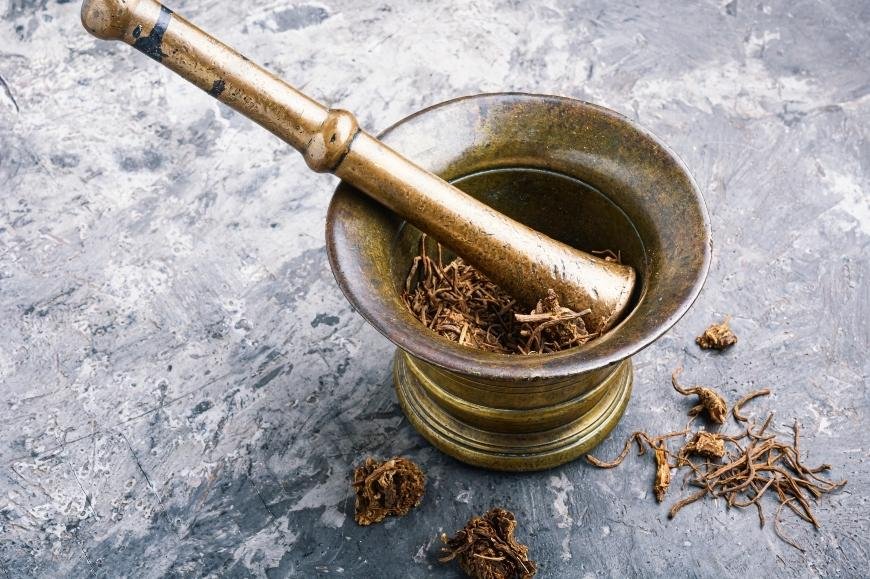What Is Valerian?
Discover the calming benefits of Valerian in our latest blog post. Learn what Valerian is, its history, effects, and safety for a natural stress relief option.

If you've been curious about Valerian, this blog post provides an in-depth exploration of its history, effects and safety. This article takes a deep dive into the intriguing world of Valerian, providing information on its history, effects and safety.
Valeriana officinalis has been used for centuries to promote relaxation and alleviate anxiety. We'll explore how valeric acid and valerenic acid contribute to these calming effects while also touching upon some intriguing antidepressant properties.
Finally, we'll discuss the safety profile of valerian extracts so that you can make informed decisions about incorporating this ancient remedy into your modern lifestyle. By the end of this post, not only will you have a solid understanding of what Valerian is but also how it works and its potential benefits.
Table of Contents:
- What is Valerian?
- History of Valerian
- Valerian Effects
- Valerian Safety
- FAQs in Relation to What is Valerian
- Conclusion
What is Valerian?
Valerian is a flowering plant native to Europe and Asia, scientifically known as Valeriana officinalis. Valerian has been utilized for generations to help with restlessness, stress, and other medical issues. The active compounds in valerian are thought to be volatile oils such as valerenic acid and valeric acid which give it its calming effect. Studies have also shown that the root of the plant contains antidepressant effects due to its high concentration of antioxidants.
Valerian extract is available in many forms including capsules, tinctures, tablets or teas. While some people prefer using the whole root form of this herb, others may opt for an extract made from a combination of several herbs like passionflower or lemon balm that can help enhance relaxation even more so than just taking plain valerian alone.
Before beginning any new herbal supplement regimen, it is advisable to consult with a physician, particularly if one is pregnant or nursing, as the effects of certain products on humans are yet to be tested. Therefore, it is important to take caution when consuming herbal supplements in order to avoid any unwanted side effects such as drowsiness during the day.
History of Valerian

Valerian has been used for centuries as a natural remedy for anxiety, insomnia and other sleep disorders. The active compound in valerian root extract, valeric acid, is thought to be the source of its calming effects. The plant itself is native to Europe and parts of Asia and was traditionally used as an herbal supplement.
Valerian Effects
Valerian is an herb derived from the Valeriana officinalis plant. Valerian has been utilized for generations to naturally treat issues such as nervousness, sleeplessness, and other medical problems. The active compounds in valerian are known as valeric acid and valerenic acid. These compounds have calming effects that can help reduce stress and promote relaxation.
Valerian has been extensively investigated for its possible advantages on slumber quality, disposition, and cognitive operation. In a study of people with mild-to-moderate insomnia, valerian extract at 500mg daily was found to enhance sleep quality by up to 30%. Research has suggested that taking a dosage of 400mg of valerian extract daily may be beneficial in decreasing depression symptoms and boosting mental clarity.
Valerenic acid is thought to be the source of Valerian extract's antidepressant properties, potentially by binding with certain receptors in the brain which may then lead to increased serotonin levels and a better emotional state. Valerenic acid binds to specific receptors in the brain, allowing it to influence mood and behavior while potentially increasing serotonin levels for improved emotional wellbeing and reduced anxiety. Studies suggest that it may also increase levels of serotonin in the brain, which can lead to improved moods and reduced anxiety levels. Additionally, Valerenic acid may act as an anti-inflammatory agent in the body by reducing inflammation associated with conditions such as arthritis or fibromyalgia syndrome (FMS).
Valerian Safety
Valerian is an herbal supplement derived from the Valeriana officinalis plant. Valerian has long been recognized as a natural sedative and antidepressant, with its use being generally considered safe. Yet, if taken in excessive amounts or with other drugs, it may cause some adverse reactions.
Valerian extract, which contains valeric acid as its main active ingredient, works by elevating levels of GABA in the brain. GABA helps regulate nerve activity and can produce a calming effect when taken in higher doses. Studies have shown that valerian extract may help reduce anxiety symptoms and improve sleep quality without causing significant adverse effects or dependency issues.
When using valerian supplements, it’s important to follow recommended dosage instructions closely to avoid potential side effects such as dizziness, headaches, nausea, stomach upset and dry mouth. Additionally, pregnant women should not take any form of valeriana officinalis due to potential risks associated with fetal development. People taking prescription medications should also speak with their doctor before taking any herbal supplements like valerenic acid as there could be interactions between them that could cause serious health problems or even death in extreme cases.
In general, valerian is thought to be safe when taken within recommended dosages and under medical supervision if necessary. Before taking valerian, it is advisable to consult a doctor, particularly if one is already on other medications. Current research findings suggest that valerian appears safe for most people who use it responsibly.
FAQs in Relation to What is Valerian

What does valerian actually do?
Valerian, a medicinal herb used for centuries to treat anxiety, insomnia and other conditions, contains active compounds such as valerenic acid and essential oils which interact with the body's receptors in the brain to produce calming effects. It contains active compounds called valerenic acid and essential oils which interact with the body's receptors in the brain to produce calming effects. Studies have also shown it can help reduce symptoms of stress, improve sleep quality, reduce restlessness and even enhance cognitive performance. Valerian is generally thought to be safe when taken as instructed, yet it may lead to some undesired effects such as drowsiness or lightheadedness if consumed with specific drugs or alcohol.
What does valerian do to humans?
Valerian is a plant-based supplement that has been used for centuries to treat insomnia, anxiety, and other ailments. It works by activating the body's natural calming response and can help reduce stress levels. Research has indicated that valerian root could enhance sleep quality, reduce tiredness during the day, and raise attentiveness throughout the daylight hours. Valerian root can be taken in various forms such as capsules or tinctures to achieve its effects on humans.
What are the negative side effects of valerian root?
Valerian root may cause headaches, dizziness, dry mouth and upset stomach in some cases; however, it can also lead to heart palpitations or low blood pressure in rare instances. In rare cases it may cause heart palpitations or low blood pressure. It is essential to speak with a medical professional prior to taking valerian root if you are on any other medicines, as it may have interactions with sedatives and antidepressants. Long-term use of valerian root has been linked to liver damage in some people. Pregnant and nursing women should not take valerian root due to potential risks.
What does valerian do to the brain?
Valerian increases GABA levels in the brain, which is beneficial for reducing stress and improving mental health. Valerian also contains several compounds with sedative effects such as valerenic acid and valerenol which help relax muscles and induce sleepiness. Additionally, it can help regulate serotonin levels in the brain, aiding mood regulation and improving overall mental health.
Conclusion
In conclusion, valerian is a plant with many benefits and potential applications. Its historical use has been documented for centuries as an aid to sleep, relaxation and calming the nerves. Overall, though caution should be taken when utilizing valerian root extract or any other natural remedy, it appears to generally be safe when consumed in moderation. As always though, caution should be taken before using any herbal supplement or natural remedy such as Valerian root extract.






































































































































